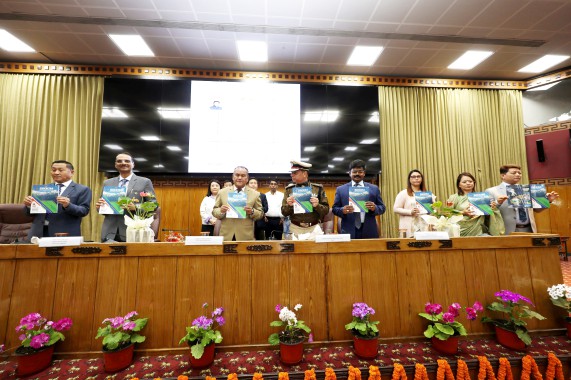




















Tuesday, Apr 22, 2025 10:45 [IST]
Last Update: Monday, Apr 21, 2025 17:44 [IST]
GANGTOK, (IPR): The State Civil Services Day organised by the Department of
Personnel (DoP) was observed at Chintan Bhawan here today with the release of the
State Civil Service magazine titled ‘Sikkim Civil Service Chronicle’.
The
minister for Agriculture, Horticulture, Animal Husbandry and Veterinary
Services, and Fisheries Departments, Puran Kumar Gurung, graced the event as
the chief guest.
The
minister extended greetings on Civil Services Day and acknowledged the
contribution of administrators towards public welfare and development. He
recalled Sardar Vallabhbhai Patel’s 1947 address to the first batch of Civil
Services officers, where Vallabhbhai had emphasised on political neutrality,
discipline, and commitment to the law. Sardar Patel described the civil
services as the steel frame of India, urging officers to serve the nation with
honesty and integrity.
The
chief guest stated that the government provides guidance, while civil servants
are the core of the administration. He advised officials to remain fair, follow
the law, and act with precision.
Expressing
concern over substance abuse in Sikkim, the minister called for coordinated
departmental efforts for awareness, monitoring, and support. He further
directed strict attendance from officials and urged them to assist the public
and guide unemployed youth towards appropriate opportunities.
He
thanked Chief Minister Prem Singh Tamang-Golay for his leadership and vision in
strengthening Sikkim’s future through clear policies and programmes.
Chief
secretary R Telang, in his keynote address, highlighted the responsibility of
civil service officers in ensuring efficient and accountable governance. He
noted that officers must respond effectively to the evolving expectations of
the public, particularly in the digital age, and adopt technology to enhance
service delivery.
He
reminded officers to prioritise public welfare over personal recognition and to
remain solution-oriented and proactive. He stressed the importance of
addressing the root causes of challenges to implement sustainable reforms.
PCCF
cum secretary Forest and Environment department, Dr Pradeep Kumar, presented
the “Mero Rukh Mero Santati” initiative. He explained that the initiative is based
on core principles such as emotional bonding, spiritual connection,
celebration, collective growth, and carbon neutrality.
Dr
Kumar stated that the initiative encourages beneficiaries to plant 108 trees
each, a culturally significant number, to foster a deeper relationship between
individuals and nature. He further explained that the initiative promotes
community involvement and aims to turn afforestation into a collective movement
that helps offset carbon emissions and supports sustainable living.
Secretary
Science and Technology department, Dr Sandeep Tambe, outlined the State’s
approach to mitigating the risks of Glacial Lake Outburst Floods (GLOF). He
highlighted the significance of early warning systems and the resilience of
infrastructure.
Dr
Tambe explained that Sikkim follows a four-step protocol: preliminary
assessment, comprehensive study, mitigation design, and execution. He added
that this approach has become a national model, enabling local scientists,
engineers, and managers to take the lead in developing long-term, self-reliant
solutions.
Secretary Social Welfare department,
Sarika Pradhan, shared the progress of the “Nasha Mukt Sikkim” initiative, which
is part of the national “Nasha Mukt Bharat Abhiyan.” She explained that the
campaign focuses on raising awareness, providing rehabilitation, and enforcing
laws. She stated that the initiative involves community leaders, educators, law
enforcement, and health professionals. She said the goals include reducing the
stigma around addiction, encouraging people to seek treatment, and building a
drug-free society. Its key activities include public education, counselling,
vocational training, and strict enforcement of the NDPS and State laws.
District
Collector Gangtok, Tushar G Nikhare, highlighted local initiatives aimed at
improving public service delivery and community well-being. He spoke about the
Mother Pod, a facility created to support mothers and children in public
spaces. It provides a safe, clean, and private area for breastfeeding and
infant care, ensuring comfort for mothers while promoting child health.
He
made a special mention of Gangtok’s Got Talent, a platform that encourages
local youth to showcase their skills in performing arts. He highlighted the
installation of Water ATMs, designed to improve access to safe drinking water
in urban areas.
The
District Collector Gangtok also introduced several digital systems aimed at
improving efficiency and transparency in public administration. These include
Amin Management System for land records, Token Management System for crowd
control, Marriage Registration System for simplified registration, Leave
Management System for employee attendance, and a Citizen Tracking Application
to monitor service delivery and citizen feedback.
District
Collector Gyalshing, Tenzing D Denzongpa, presented the “Smart-Recall”
programme, a flashcard-based revision tool designed to improve students’ memory
retention in key subjects. He explained that the programme enhances learning by
using visual and repetitive techniques to reinforce important concepts.
The
District Collector Gyalshing added that the initiative is being expanded
through teacher training and integration into the school curriculum. A local
digital flashcard repository is also being developed to support wider access
and long-term use.
District
Collector Soreng, Dhiraj Subedi, spoke about several outreach initiatives aimed
at improving public services and community engagement. He highlighted the
“Swaccha Pani, Swastha Hami” campaign, which focuses on cleaning water tanks to
ensure safe and hygienic drinking water. The initiative involves regular
inspections, community participation, and awareness to prevent waterborne
diseases.
The
District Collector Soreng spoke about “One Day at School”, an initiative to
strengthen administrative engagement with schools. Through this programme,
officials visit schools to understand challenges, interact with students and
teachers, and support improvements in the learning environment. He also
discussed “Aanganma Prashasan”, which brings government services to the
doorsteps which ensures timely access to essential services without requiring
travel to government offices.
The
District Collector Soreng introduced the “Companion Box” project, a
confidential reporting system for students to share concerns about safety and
well-being. He further shared that, in collaboration with the Piramal
Foundation, the district is conducting “Mohalla Classes” and reading campaigns.
These programmes aim to improve foundational learning among children,
especially in remote areas, by bringing education closer to the community.
District
Collector Namchi, Anupa Tamling, shared details about the “Prayas” initiative,
which supports rural producers and self-help groups by providing them with
access to weekly markets through stalls set up in government office spaces.
This platform helps promote local products, generate income, and connect rural
entrepreneurs with a wider customer base.
The
District Collector Namchi highlighted that one self-help group under the
initiative has begun converting used plastic banners into reusable grow bags.
This effort promotes waste-to-wealth practices and encourages sustainable
livelihoods. She stated that “Prayas” demonstrates how local governance can
strengthen rural economies and create formal market linkages for small
producers, enabling long-term economic participation and growth.
Earlier,
the programme commenced with a welcome address delivered by secretary
Department of Personnel, Chewang Rinzing Bhutia.
The
programme concluded with a word of thanks proposed by additional secretary
Department of Personnel, Mahesh Sharma.
Present
in the celebration were chief secretary Mr R Telang, Director General of Police
Akshay Sachdeva, principal secretary Tourism and Civil Aviation department CS
Rao, principal secretaries, heads of departments, State Civil Service officers,
officials and staff of Department of Personnel.
